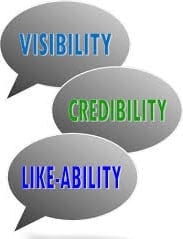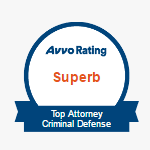Criminal defense lawyers are reservoirs of credibility. We work to establish it with prosecutors, judges, and witnesses . . . not to mention the juries who adjudge our clients’ fate. With potential new clients, from the moment they decide to call for the first consultation, until our case file is closed, credibility makes the attorney-client relationship work. Consequently, marketing our credibility is an important strategy to distinguish ourselves from the fierce competition for legal services. Although the personal referral is still the best way to establish trust with a new client, the trust building process usually begins online as more people search the Internet for goods and services. How do we utilize the Internet to accomplish our purpose of building credibility and effectively marketing our services to potential clients?
they decide to call for the first consultation, until our case file is closed, credibility makes the attorney-client relationship work. Consequently, marketing our credibility is an important strategy to distinguish ourselves from the fierce competition for legal services. Although the personal referral is still the best way to establish trust with a new client, the trust building process usually begins online as more people search the Internet for goods and services. How do we utilize the Internet to accomplish our purpose of building credibility and effectively marketing our services to potential clients?
It doesn’t matter whether you have a better service than your competitors if folks never get an opportunity to test your mettle. Most lawyers need an Internet website presence which effectively captures attention, reflects their personal style, and begins to build credibility with a potential client. We know Google (et al.) is how most prospects locate your legal services. When a potential client clicks on your website link they have a serious problem. They are frightened, they want help, and they are very impatient. Accordingly, you have only minutes (if not seconds) to capture their incipient trust. This trust results in an appointment on your calendar. Your website presence must create an effective “first impression” or the person will quickly move on and avoid calling.
At a foundational level potential clients ask themselves “will I like this lawyer?” Attractive and interesting photographs on your website can help reveal your personality. Consider hiring a professional photographer to create high-quality action snapshots. Produce images of you working with others, walking to the courthouse, or researching at your desk. Consider photographs depicting landmarks or geographical points of interest, anything which might help you connect with the prospect. Above all, avoid “clip-art” images. Clip-art is pre-fabricated and looks false. It communicates a negative message about you. Potential clients are looking for a winner. Clip-art does not communicate a winning brand. Hence, use original photographs demonstrating your success, attractiveness, and likability. Similarly, your website is strengthened by tranquil colors, appropriate white-space to avoid a cluttered look, and simple navigation to thwart frustrating a person looking for information. A professional video can also effectively communicate your style and empathy for potential clients in trouble.
Next, is your website about the client or about you? Lawyer-centered websites rarely communicate empathy for the potential client. If the person does not believe you care about them, they will not call. Remember that people don’t buy what you do . . . they buy why you do it. Consequently, avoid the trap of seeming self-absorbed and boastful. I admit there is a fine line between selling yourself and appearing self-centered. I further concede that some consumers are attracted to a cocky presentation style. However, using language expressing empathy for a frightened person is the client-centered approach to marketing. Frankly, it works better. And beyond the marketing, a potential client must believe you genuinely care about their problem. So, communicate strength and compassion at the same time. Position images on your website to convey these same impressions.
Lastly, does your website content identify your expertise and competence? What questions might a person be asking? Answer those questions on your website utilizing well-organized navigation. Create content providing value to the client. In a like manner, third-party validation can build your credibility. Links to Super Lawyers, FindLaw, Avvo, and Martindale-Hubbell (etc.) signal your credibility to a potential client. Does anyone recommend you? Are there client reviews and testimonials on your website? Consider asking former clients for testimonials and utilize them with permission. Also, the importance of cultivating a strong online reputation cannot be over-estimated. Your online reputation is an additional form of 3rd party validation. Potential callers scour the Internet for reviews about you before they schedule an appointment. Sites like Avvo, Google +, and Yelp assist defense attorneys in building this auspicious reputation. Accordingly, develop office systems to regularly request positive client reviews. If (and when) you receive a negative review, address it immediately with a professional and thoughtful response.
In summary, impatient online consumers increasing employ the Internet to pinpoint competent criminal defense lawyers. Although no marketing strategy is perfect, learn to use your online presence to compete in this fierce marketplace. After your website does its job make sure you deliver what your website promised. Quickly return phone calls or emails generated from your site to schedule initial consultations. Get the client on your calendar within 24 hours, if possible. Assure that live people answer telephone calls during off-hours. Be available to the client when the client needs you! Since we’re in the service business, the sooner we begin providing service the sooner our credibility builds. Lastly, do not forget your website must be approved by the Advertising Review Committee of the State Bar pursuant to Part VII of the Texas Disciplinary Rules of Professional Conduct. Access the State Bar’s website for instructions on how to submit your site for review.
(“Off the Back” featured in the “Voice For The Defense” December 2014)
Stephen Gustitis is a criminal defense lawyer in Bryan-College Station. He is Board Certified in Criminal Law by the Texas Board of Legal Specialization. He is also a husband, father, and retired amateur bicycle racer.
“Off the Back” is an expression in competitive road cycling describing a rider dropped by the lead group who has lost the energy saving benefit of riding in the group’s slipstream. Once off the back the rider struggles alone in the wind to catch up. The life of a criminal defense lawyer shares many of the characteristics of a bicycle rider struggling alone, in the wind, and “Off the Back.” This column is for them.







